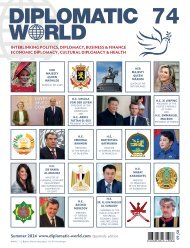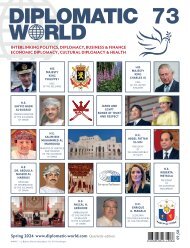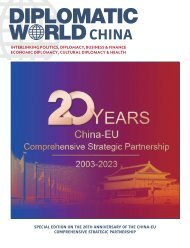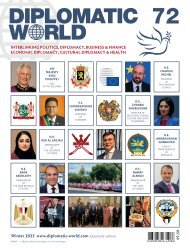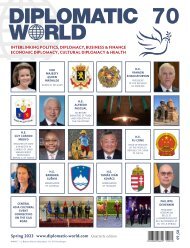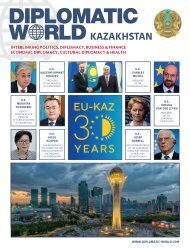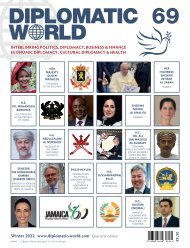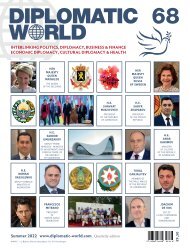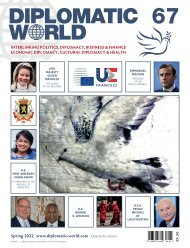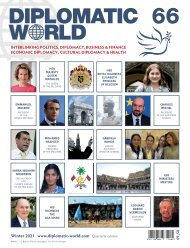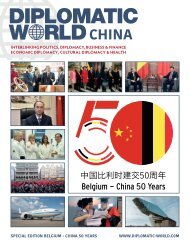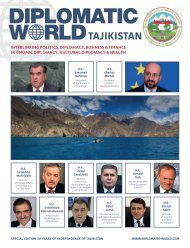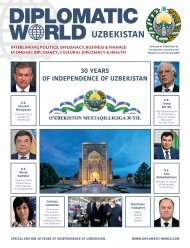Diplomatic World 67
You also want an ePaper? Increase the reach of your titles
YUMPU automatically turns print PDFs into web optimized ePapers that Google loves.
2021 was the International Year of Creative Economy for<br />
Sustainable Development. <strong>Diplomatic</strong> <strong>World</strong> explored and<br />
highlighted through two articles what cultural diplomacy can<br />
look like through lenses of sustainability, cooperation, mutuality<br />
and solutions on global challenges.<br />
The question “Can the International Year of Creative Economy for<br />
Sustainable Development bring innovation to cultural diplomacy?”<br />
was also asked and two articles highlighted different international<br />
collaborative projects with actions and results aligned<br />
with several of the Sustainable Development Goals (SDGs).<br />
This article looks back at the year and provides some food for<br />
thought on questions like “Did the year influence policy?”<br />
“How has it reached culture and creative sector professionals?”<br />
“What has been done during this year?”<br />
We also talk to Emmy-winning film-maker, curator and Founder<br />
of Create2030 and The ARTS x SDGS Festival, Lisa Russell.<br />
CONTEXT: THE INTERNATIONAL YEAR OF<br />
CREATIVE ECONOMY FOR SUSTAINABLE<br />
DEVELOPMENT<br />
In 2019, a United Nations resolution created the International<br />
Year of Creative Economy for sustainable development and the<br />
UN mandated the United Nations Conference on Trade and<br />
Development (UNCTAD) to implement it.<br />
UNCTAD has been the lead agency driving the events and<br />
observations of the year, alongside UNESCO (United Nations<br />
Educational Scientific and Cultural Organisation), WIPO (<strong>World</strong><br />
Intellectual Property Organisation), UNIDO (United Nations<br />
Industrial Development Organization), the WTO (The <strong>World</strong> Trade<br />
Organization) and others.<br />
LOOKING BACK<br />
AT THE INTERNATIONAL YEAR<br />
OF CREATIVE ECONOMY<br />
FOR SUSTAINABLE DEVELOPMENT<br />
Many different policy discussions and exchanges have taken<br />
place during the year. There was for example, the Culture Summit<br />
in Abu Dhabi, with participants from governments, policy and<br />
other institutional representatives. Representatives from the art<br />
world were also invited. The UNESCO 14th Intergovernmental<br />
Committee of the 2005 Convention for the Protection and<br />
Promotion of the Diversity of Cultural Expressions focused,<br />
among other things, on the international year. There was a UN<br />
high-level event on culture and sustainable development for<br />
Member States where for example experiences were shared<br />
on crisis-response measures to support the creative economy<br />
during the pandemic, how to identify implementation gaps and<br />
solutions and call for strengthening strategic cross-sectoral partnerships<br />
to unlock the transformative potential of culture.<br />
Many of the events have surely increased awareness of creative<br />
economy among governments. It would be interesting to do<br />
an analysis and evaluation of all policy dialogues having taken<br />
place within the context of the international year to see what<br />
the outcomes are. One interesting highlight announced at the<br />
<strong>World</strong> Conference of Creative Economy in December 2021 by the<br />
UAE government was that they have placed creative and culture<br />
industries at the centre of future growth and they have created a<br />
10-year strategy around this.<br />
There are two upcoming interesting follow-ups in regards of the<br />
international year.<br />
The first is the upcoming session of the UN General Assembly<br />
where UNCTAD and UNESCO will “inform about the implementation<br />
through a dedicated section of the Creative Economy<br />
Outlook, elaborating in particular on how the resolution is aligned<br />
with, and advances, the 2030 Agenda, including recommendations<br />
on concrete actions that would help Member States and<br />
the United Nations system to accelerate their efforts in the implementation<br />
of the Agenda”.<br />
The second one is a UN resolution on Culture and Sustainable<br />
Development from November 2021 that calls for a report of implementation<br />
for the same topic for its 78th session in 2023.<br />
These kinds of policy events and dialogues may be seen as abstract<br />
for practitioners. It is clear that there is a need to balance<br />
high-level meetings with practitioner dialogues and events. It is<br />
a problem if sector professionals do not know what is happening<br />
in terms of policy development.<br />
ARTISTS AND CREATIVES PARTICIPATION<br />
Lisa Russell is an Emmy-winning film-maker, curator, founder of<br />
Create2030,and equally founder of The ARTS x SDGS Festival.<br />
This festival brings together members of the growing creative<br />
economy with UN/NGO agencies, the private sector and academia<br />
in support of the SDGs. The first festival was held in<br />
April 2020 and it continues as a gathering for socially conscious<br />
artists and creatives.<br />
Lisa says that she was enthusiastic when the international year<br />
was announced. She had known about it since 2018 and she felt<br />
that the year was going to amplify the important role artists and<br />
creatives bring in helping to solve some of world’s greatest problems<br />
– not just as entertainers or “cheerleaders” for the SDGs,<br />
but to utilize the inherent creative thinking and problem solving<br />
skills to help develop innovative solutions and to help “translate”<br />
the SDGs to a wider audience.<br />
LISA, WHAT WAS YOUR EXPERIENCE WITH THE<br />
INTERNATIONAL YEAR OF CREATIVE ECONOMY?<br />
As 2021 started, I hosted an online event welcoming the international<br />
year that was attended by hundreds of artists, cultural operators<br />
and policy experts interested in ways arts and creativity<br />
could support sustainable global development.<br />
Although unplanned, it also became a year where I began to<br />
strongly advocate for the rights of artists at the UN – in support<br />
of respecting intellectual property rights and ensuring artists<br />
were compensated.<br />
As the Founder of Create2030 and curating many working class<br />
artists, I felt it was my responsibility to push for responsible and<br />
meaningful participation of arts and to also speak out about the<br />
various initiatives and campaigns that were hurting artists at the<br />
height of the COVID-19 pandemic when many of us lost work.<br />
For example, there were numerous UN-led “creative briefs”,<br />
“arts contests” and “calls for art” that were asking for artists to<br />
contribute artwork for free but then were given pro-bono to mega<br />
corporations like Facebook and BBC. I know I made a lot of<br />
people uncomfortable but these were very harmful initiatives that<br />
were created not out of “bad intentions” but because policy and<br />
programme experts who develop these initiatives don’t always<br />
understand our work cultures or our industry standards.<br />
That is why in 2022, I continue to advocate for artists representation<br />
at the United Nations in order to create more ethical policies<br />
regarding engaging artists in sustainable development. I did<br />
my third TEDx talk on why the UN needs an Arts Envoy for the<br />
international year.<br />
I also created a new Change.org petition with an Open Letter to<br />
the UN Secretary-General on the need for artist representation at<br />
the UN.<br />
After speaking at the second <strong>World</strong> Conference on Creative<br />
Economy hosted by the Government of UAE, it became apparent<br />
to me that arts and storytelling must be at the heart of the SDGs.<br />
In order to do this, we need to train artists how to effectively<br />
work in the global diplomacy space, and we need to train UN/<br />
NGO entities how to effectively work with professional curators<br />
to engage artists in a responsible manner.<br />
WHY DID YOU START THE THE ARTS X SDGS<br />
FESTIVAL?<br />
The Festival was conceived of in late 2019 to be held in and<br />
around the United Nations as a place where artists and UN/NGO<br />
actors could come together in support of the SDGs. The first festival<br />
was scheduled to occur April 15-21, 2020 to coincide with<br />
<strong>World</strong> Creativity and Innovation Week.<br />
When COVID-19 was on the rise, we made the decision to pivot<br />
to an online gathering and with the support of Earthx Film, we<br />
hosted a very dynamic one-week, online festival filled with art<br />
showcases, daily webinars and weekend workshops for creatives.<br />
As a creative practitioner in the UN/NGO space (I work as contracted<br />
film-maker and arts curator), I felt it was necessary to<br />
host an artist-led gathering to help tailor the festival to an artist<br />
audience. While we invited policy and programme experts to<br />
present and attend, our intent was to really tailor to artists and<br />
storytellers interested in working in the sustainability space.<br />
The reason why it is important to support artist-led gatherings it<br />
that we speak a “different language” and have a different work<br />
culture so we tailor the festival to meet artists where they often<br />
congregate. Often that is not conferences but rather spaces<br />
where creativity, free thinking, and critical thinking are emphasized.<br />
As COVID-19 continued to financially impact artists and creatives,<br />
we continued hosting the online gathering every 4-5<br />
months and have just completed our fifth edition. The focus<br />
shifted to provide members of the creative economy who lost<br />
gigs and were struggling financially, with skills-based workshops<br />
and discussions to focus on uplifting livelihoods.<br />
154 155




